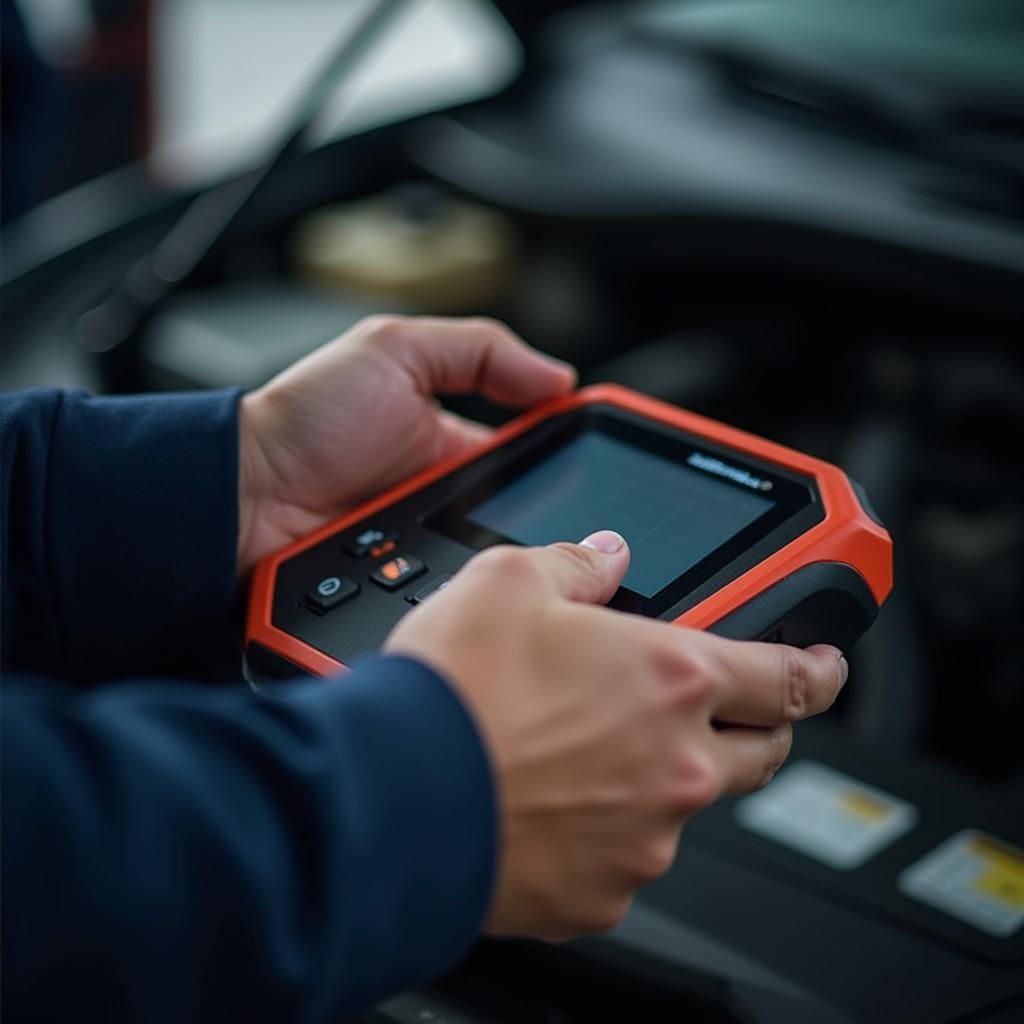Auto Service Specialists are essential for keeping your car running smoothly and safely. Whether you need a routine oil change, a complex engine repair, or anything in between, finding a reliable and skilled auto service specialist is crucial. But with so many options available, how do you choose the right one for your needs?
This comprehensive guide will equip you with the knowledge and insights to navigate the world of auto service specialists, ensuring you make informed decisions for your vehicle’s well-being.
What is an Auto Service Specialist?
An auto service specialist is a trained professional who diagnoses and repairs vehicles. Their expertise spans a wide range of services, including:
- Routine Maintenance: Oil changes, tire rotations, brake inspections, fluid top-offs
- Mechanical Repairs: Engine repair and replacement, transmission service, suspension work, exhaust system repair
- Electrical System Diagnosis and Repair: Battery testing and replacement, alternator and starter repair, wiring harness inspection
- Heating and Air Conditioning: A/C refrigerant recharge, heater core replacement, blower motor repair
- Other Services: Pre-purchase inspections, emissions testing, performance upgrades
Types of Auto Service Specialists
You’ll encounter various types of auto service specialists, each with its pros and cons:
- Dealerships: Offer specialized knowledge of specific car makes but tend to be more expensive.
- Independent Garages: Often provide more personalized service and competitive pricing.
- Specialty Shops: Focus on specific areas like transmissions, tires, or exhaust systems.
- Mobile Mechanics: Offer convenience by coming to your location but might have limitations in complex repairs.
 Modern auto service shop interior with a car on a lift.
Modern auto service shop interior with a car on a lift.
Essential Factors to Consider When Choosing an Auto Service Specialist
Selecting the right auto service specialist can be daunting. Here are crucial factors to guide your decision:
- Reputation and Reviews: Look for online reviews and testimonials from previous customers to gauge their reliability and quality of service.
- Certifications and Experience: ASE (Automotive Service Excellence) certification indicates a high level of competency. Consider their years of experience, especially with your car’s make and model.
- Specialization: If your car requires a specific repair, seek out specialists with expertise in that area.
- Communication and Transparency: Choose a specialist who clearly explains the problem, proposed solutions, and associated costs.
- Warranty and Guarantees: Inquire about warranties on parts and labor to safeguard against potential issues.
- Location and Convenience: Consider factors like proximity to your home or work, operating hours, and availability of loaner cars.
- Technology and Equipment: Modern diagnostic tools and equipment can significantly impact the accuracy and efficiency of repairs.
Questions to Ask Potential Auto Service Specialists
Don’t hesitate to ask questions to ensure you’re making the right choice:
- “What experience do you have with my car’s make and model?”
- “Can you provide a detailed estimate for the repair?”
- “What warranties do you offer on parts and labor?”
- “Do you use original equipment manufacturer (OEM) or aftermarket parts?”
- “What is the estimated turnaround time for the repair?”
Tips for Maintaining a Good Relationship with Your Auto Service Specialist
Building a strong relationship with your auto service specialist can lead to better service and potentially lower costs over time:
- Be Proactive: Schedule regular maintenance appointments to prevent small issues from becoming major problems.
- Communicate Clearly: Describe any issues with your car accurately and thoroughly.
- Ask for Clarification: If you don’t understand something, don’t be afraid to ask for an explanation.
- Maintain Records: Keep a record of all repairs and maintenance performed on your vehicle for future reference.
Red Flags to Watch Out For
Be wary of any auto service specialists exhibiting these red flags:
- High-Pressure Sales Tactics: Be cautious of specialists who pressure you into unnecessary repairs or services.
- Lack of Transparency: Avoid specialists who are evasive about their pricing, processes, or qualifications.
- Poor Communication: If a specialist is difficult to reach, dismissive of your concerns, or unclear in their explanations, it’s a sign to look elsewhere.
- Negative Reviews: Pay attention to consistent complaints about the specialist’s honesty, quality of work, or customer service.
 Mechanic using a diagnostic scanner on a car's engine.
Mechanic using a diagnostic scanner on a car's engine.
Conclusion
Finding a trustworthy and skilled auto service specialist is vital for every car owner. By understanding the different types of specialists, the essential factors to consider, and the right questions to ask, you can make an informed decision that gives you peace of mind and keeps your vehicle running smoothly for years to come. Remember, proactive maintenance and open communication are key to a long and healthy relationship with your chosen auto service specialist.
FAQs about Auto Service Specialists
1. How often should I service my car?
Refer to your owner’s manual for recommended service intervals. Generally, an oil change every 3,000 miles or 3 months and a more thorough inspection every 12,000 miles or 12 months are good starting points.
2. How can I tell if an auto service specialist is ASE certified?
Look for ASE logos on their website, signage, or ask if their technicians are ASE certified. You can also verify certifications on the ASE website.
3. Is it always cheaper to go to an independent garage than a dealership?
While independent garages often have lower labor rates, dealerships might offer specialized services or have access to OEM parts that independent garages don’t. It’s best to get quotes from both to compare.
4. What should I do if I’m not happy with the service I received?
First, try to address the issue directly with the auto service specialist. If that doesn’t work, consider leaving an honest review online and contacting your local consumer protection agency if necessary.
5. How important is it to use OEM parts?
OEM parts are made by the original manufacturer and are often considered superior in quality and fit compared to aftermarket parts. However, aftermarket parts can be a more affordable option and might be suitable for certain repairs. Discuss the pros and cons of each with your chosen specialist.
Need expert assistance with your vehicle? Our team of dedicated auto service specialists is here to help. Contact us via WhatsApp: +1(641)206-8880 or Email: [email protected] for 24/7 support.


